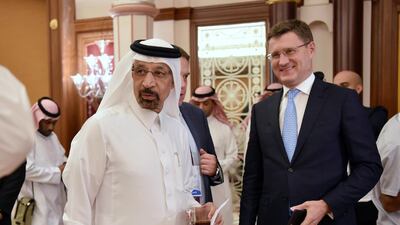Opec+ was unconcerned about falling oil demand as it plans to rollover ongoing production cuts well into the second half of the year at its latest technical committee meeting in Jeddah.
"So far I'm nor concerned about demand. US demand has gone up significantly and I think Asian demand has picked up," Saudi Energy Minister Khalid Al Falih said in the Saudi Red Sea city.
"Chinese demand over the 12 months has gone up easily by 50 to 60 per cent. Indian demand is going up, Japanese demand and Korean demand has gone up. Demand growth is at healthy levels,” he added.
However, the markets need to be careful during the second half, in the event of any "demand shocks", he said.
The minister's comments come amid concerns over faltering demand from Asia, particularly China.
The International Energy Agency revised downward headline demand forecast for 2019 by 90,000 barrels per day to 1.3 million barrels per day, citing weaker growth expected from Brazil, China, Japan, Korea and Nigeria.
The slow demand growth will, however, be "short-lived" the agency said, with a pick up expected for the rest of 2019. The IEA also warned of considerable imbalance on the supply side for the second quarter, despite a surplus of 700,000 bpd over demand at the start of the year.
Opec+, which is led by Saudi Arabia and Russia, reached a vague consensus at their joint ministerial monitoring committee meeting in Jeddah saying, “critical uncertainties” remained and left it to the upcoming session in Vienna in June for effective recommendations.
Mr Al Falih said that continuing present production cuts to the tune of 1.2 million bpd since January would be likely.
"The one that seemed to resonate with large number of ministers is to rollover agreements from the first half while also looking at how things will change between now and then,” he said.
"Ministers planning on the rollover also acknowledged the need to stay vigilant, watch the markets and adjust to any major unintended changes, major shocks, supply disruptions of that sort,” Mr Al Falih added.
The markets were well supplied Opec said, even to withstand what could be a million barrels of Iranian oil leaving the markets following the US cancellation of waivers to Iran's buyers.
Mr Al Falih, however, said the committee was unclear on how much oil Iran was getting to the markets. Tehran had no representative at Opec’s technical committee meeting.
"There is a lot of oil leaving the markets from Iran," he said. "No body knows what is doing, what Iran is losing. [It is] highly speculative, and highly uncertain."
Saudi production, meanwhile, averaged 9.7 million bpd, Mr Al Falih added, and said the country was willing to be flexible with its output, if needed.
The Opec committee would monitor the build-up on crude inventory levels ahead of its next meeting, but declined to say what specific level of reduction in stocks they would likely target.
“We’re not fooled by current prices. We think the market has been fragile. We’ve seen it in the second half of last year because inventories were still high and we prematurely increased production because of [Iran] sanctions and as a result we saw output leave the markets,” said Mr Al Falih.
“[We look to] keep production and allow inventories to decline softly and towards normal levels until we get to solid fundamental grounds,” he added.


